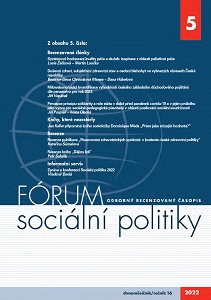Percepce principu solidarity a role státu v době před pandemií covidu-19 a v jejím průběhu jako výzva pro sociálně-pedagogické působení v oblasti posilování sociální soudržnosti
Perception of the principle of solidarity and the role of the state before and during the Covid-19 pandemic as a challenge for socio-pedagogical action in the field of strengthening social cohesion
Author(s): Jiří Pospíšil, Ivana OleckáSubject(s): Politics, Education, Political Sciences, Health and medicine and law, Family and social welfare, Present Times (2010 - today)
Published by: Výzkumný ústav práce a sociálních věcí
Keywords: Covid-19; solidarity; role of the state; inequality; social education;
Summary/Abstract: The Covid-19 pandemic affected the economic, social and political lives of all citizens. The primary theoretical assumption of this paper is that the impact of the Covid-19 pandemic led to a shift in the understanding of the role of the state in terms of strengthening solidarity and the belief that there should be a greater degree of state involvement in the addressing of social threats. Secondary assumptions point to the changing influence of gender, age and education on perceptions of solidarity and the role of the state. The primary hypothesis tested whether a change occurred in terms of attitudes towards state social policy between the pre-Covid and Covid eras. Furthermore, we formulated hypotheses on gender, age and education differences. The statistical significance of the hypotheses was tested using the χ2 statistic and for C × R contingency tables. The validity of the primary hypothesis was not confirmed (p = 0.18). In both years, the opinion of more than 50% of the population was that people should take care of themselves and should bear full responsibility for their future. In contrast, the influence of all the socio-demographic variables was confirmed, thus leading to structural differences in perceptions of solidarity and the role of the state. Social-educational programmes at both the prevention and intervention levels could contribute to strengthening cohesion and reducing tensions.
Journal: Fórum sociální politiky
- Issue Year: 2022
- Issue No: 5
- Page Range: 29-34
- Page Count: 6
- Language: Czech

